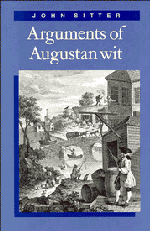Book contents
4 - Gravity, abstraction, and crackpot materialism
Published online by Cambridge University Press: 28 January 2010
Summary
The task consists in forcing the thinglike environment, which mechanically influences the personality, to begin to speak, that is to reveal in it the potential word and tone, to transform it into a semantic context for the thinking, speaking and acting (as well as creating) personality … A thing, as long as it remains a thing, can affect only other things; in order to affect a personality it must reveal its semantic potential, become a word …
Bakhtin, “Toward a Methodology for the Human Sciences”Gravity and the fall into abstraction
The pun on gravity lurking in Augustan writing is not an expression of deathbed wit, as in Mercutio's “Ask for me tomorrow, and you shall find me a grave man,” but a way of naming the dull weight opposed to wit, as in Pope's account of small spite – “The graver Prude sinks downward to a Gnome” – or large mindlessness: “None need a guide, by sure attraction led, / And strong impulsive gravity of Head” (The Rape of the Lock, I. 63; Dunciad, IV. 75–76). Pope is unique in working out the pun so fully (much of the “plot” of the final Dunciad is gravitational), but the general idea of the dull man as one who has no counterforce to his own weight is farcically visible in ShadwelPs “large bulk” and Flecknoe's “sinking” (Mac Flecknoe, lines 195–96, 214) and grimly so in the fall “headlong down” of Rochester's reasoning engine.
- Type
- Chapter
- Information
- Arguments of Augustan Wit , pp. 125 - 154Publisher: Cambridge University PressPrint publication year: 1991

